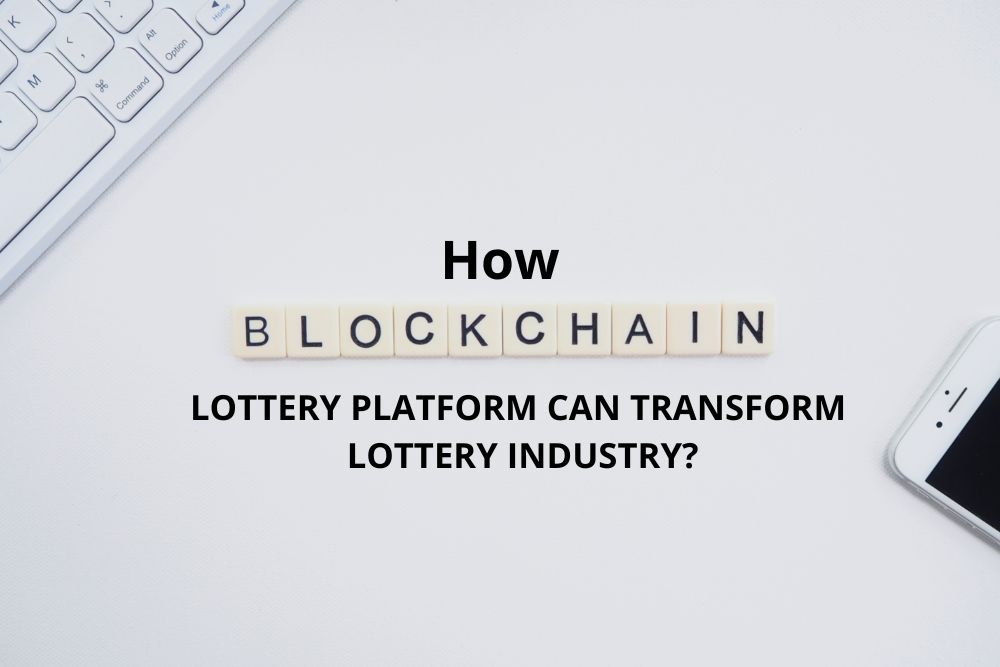HOW BLOCKCHAIN LOTTERY PLATFORM CAN TRANSFORM LOTTERY INDUSTRY?

Blockchain lottery: In order to win the big rewards in the lottery, players must select particular numbers from a hat. Although it is often thought of as a gaming product, it is actually a high volume industry that might also be labeled a commodity.
According to one of the lottery directors, lotteries are unique in comparison to other gaming products. Lottery people stake a modest amount of money in hopes of winning a substantial prize, with the net winnings going to the general welfare.
A whopping 29 percent of all gaming revenue worldwide goes to the lottery sector.
The global lottery saw an increase from $187.1 billion in 2004 to $284.3 billion in 2014, representing an annual growth rate of 4.3 percent over that time.
But as the digital economy expands, the sector must contend with issues like unfairness and a lack of transparency.
With cutting-edge technologies like blockchain, the world needs more fairness and transparency.
Blockchain’s distributed architecture promises revolution in the lottery sector.
Let’s first learn about the difficulties the sector is facing before we explain how online blockchain lottery implementation would improve the current lottery system.
Challenges faced by the Lottery Industry
Fairness
To reduce the potential of manipulation or fraud, the integrity of the games must be guaranteed. Lottery participants question whether lotteries are fair and pose the following queries:
- Do the offer and ticket exist or not?
- How secure and random is the random number generation (RNG) process?
- Are the awards given out on time?
- Is the lottery winner legitimate?
- Is the money collected in one place used for charitable purposes?
Traditional lotteries lack systemic justice because they cannot adequately address the aforementioned questions.
Availability
Users from other nations are unable to participate in the biggest lotteries in the world because of the limited domestic market. They can only take part in smaller, neighbourhood lotteries.
Although new online solutions let players buy US or international lottery tickets, there are additional service fees and fraud and management risk.
The way lotteries are conducted in various parts of the world is currently governed by state and legal restrictions. On average, the prize pool receives no more than 50% of the money received from ticket sales.
Distribution of Funds
Lotteries provide money for charitable causes and other social endeavours. Players may, however, question whether cash are distributed fairly in many instances where there is high levels of corruption in the nation.
Building faith in the particular lottery association may be the largest issue for the players because there is no means to find out information regarding the distribution of monies.
The blockchain may add data without the threat of a single point of failure since it is a distributed ledger technology with a secure write-forward authentication scheme. The ledger is a replica that is present on every node in the blockchain network.
Users are able to change the data in the ledger themselves, independent of a third party. People have more control and flexibility as a result.
How could Blockchain Lottery Platform work?
Step 1: Players sign up to the lottery platform
To participate in the lottery and become a member of the platform, lottery players must sign up for an account.
They provide the following information when they register for the online blockchain lottery system.
- Name
- Wallet Address
- Email Id
- Phone Number
After a successful sign-up, players can regularly receive alerts and updates about ticket opportunities.
Step 2: Admin announces the ticket openings and deploys the smart contracts
Administrator posts a notice on the platform alerting people to new ticket openings. To provide fairness and transparency to the ecosystem, they also use smart contracts, which have pre-defined rules for the lottery game.
Smart contracts provide data privacy and transparency by ensuring which information should be shared with which system stakeholder.
The players’ identities are kept a secret because they can purchase the tickets using bitcoins. A public blockchain’s ability to retain transactions provides for traceability and makes it simpler to handle disputes and scandals involving lotteries.
Step3 : A Random number is generated and recorded on the blockchain lottery
The technique depends on current random blockchain transactions since the random number generator is built on the blockchain. To produce each winning number sequence, it draws a predetermined number of numbers in a specific order.
The lottery platform increases the level of randomness in the selection process because no one knows what transaction will occur next in the blockchain.
When the generated random number matches the player’s ticket number, they win, and money is automatically transferred to their individual wallets.
The smart contracts specify how much money will be given to players.
Therefore, each player on the site receives the predetermined commissions and money.
Additionally, players can check the rules outlined in the contracts to validate whether or not the monies are allocated fairly by viewing the smart contract code, which is publicly accessible on the site.
Step 4: Players can trace back the history of records of transactions
Players may look back in time to find out who had won the jackpot and whether the commissions and wins were paid out in accordance with the terms of the smart contracts because the transactions are recorded on the blockchain.
Here’s how blockchain lottery can bring enhancement to the lottery industry
Improve fairness with the smart contracts
A smart contract is an electronic contract between two parties that uses computers to enforce conditions and make transactions transparent. It is impossible to change the rules of an online blockchain lottery once it is set up.
There won’t be any issues with winnings because the game isn’t controlled by a single entity. Without the involvement of middlemen, the player’s money can be deposited straight into the contract.
Privacy and Accessibility
Casinos are increasingly turning to cryptocurrencies for payment methods, either as a replacement for fiat money or as the main one.
Users can gamble anonymously using bitcoins without submitting copies of their identification.
Additionally, since there is a low entry barrier for new players and the ability to evade gambling rules that are applied to fiat currency, cryptocurrencies can make online gambling accessible.
Traceability
Players can view the preserved transactions in a transparent and verifiable manner because all of the records are kept on the blockchain. They can track down the source of conflicts if any arise in the future thanks to the platform’s traceability feature.




